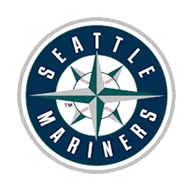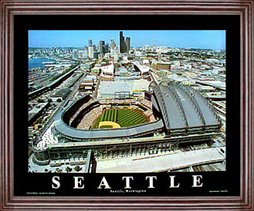The Mariners are failing on so many levels this season, you could write an entire 500 page book on it. Their defense by many accounts is the worst in the league. Even worse, this team doesn't know how to evaluate its own defense. It still think Yuniesky Betancourt is Omar Vizquel jr. when he is one of the worst defensive short stops in the league. Raul Ibanez is actually worse defensively than Manny Ramirez, yet the team keeps trotting him out there. The team has recently moved Ichiro to right field and put in Bloomquist at center field temporarily. Lastly, they have given Jeremy Reed, definitley our 2nd best outfield defensively, some reps at the first base position.
The Mariners, for whatever reason, have also some of the worst hitting in the league. Last season, at some point, everyone on the starting 9 besides Richi Sexson was hitting .280 or above. I know batting average is an archaic measurement of offensive prowess, but needless to say, in Safeco Field, that is still pretty impressive. Unfortunately, the front office's perogative has been to look at batting average, and apparently ignore patience and power. Raul Ibanez, Adrian Beltre, and Richie Sexson were the ones with power starting this season, and when you have only 3 guys on your roster who have a decent shot at breaking the 25 home run barrier, there's probably going to be a problem. Johjima, Betancourt, and Lopez all had less than 15 walks each last season, which shows some serious plate discipline problems.
The Mariners' starting pitching, supposedly one of the best in the majors, is falling apart. We supposedly have two aces and 3 pitchers capable of being "number 3" pitchers". Well, all three of our number three pitchers are playing at replacement level pitchers. Our number ones have both shown flashes of Cy Young ability, and some times it's hard to tell if it is our defense or little injuries that is making things worse. Perhaps the problem is Mel Stottlemyre and his "establish the fastball" mantra. Felix Hernandez, after 57.1% and 57.0% fastballs for the previous two years, is throwing 65.3% fastballs this year. Bedard had a career year last year, getting 10.8 k/9, but has raised his fastball percentage from 57.9% to 63.7% and his groundball percentage is down from 47.9% to 40.5%. Batista's fastball and cutter percentages are both up, and Washburn's fastball percentage is drastically down, while Silva's is 2% lower. Whatever the case is, no one in their right mind would offer Washburn around $40 million for 4 years, or give Silva $48 million over 4 years.
I've heard a lot of talk about bad process bad results lately, and I have to think this is right. There's a book entitled When Genius Fails, about Nobel Prize winners who open up a hedge fund called Long Term Capital Management, and how it had huge returns until it bombed out and failed miserably. The book argues that it is very possible that these geniuses knew what they were doing, but merely met up with unexpected bad results, a classic good process bad results process. Clearly what we're dealing with is a bad process bad results process. The team seems to be blindly unaware of its many deficiencies that simple bloggers who do research in their spare time have spotted. If the Mariners were a company, they'd either already be bankrupted, or their shareholders would have demanded that they fire the CEO (Howard and Lincoln, not just Bavasi). I think a normal company would have to look at itself and say, why are we paying $48 million dollars for this inventory when competing company's are merely getting it for near free from the draft or from free agency. A good example is of Jorge Campillo, a starting pitcher the Mariners had, but for whatever reason, were unwilling to start. He was a soft tossing righty, and if had been a lefty, the Mariners might have given him a chance, but he wasn't, and now he's pitching well in a starting position for the Braves.
There are so many exmamples I could show of how the Mariners are proving themselves to be inept. Whether its their inept handling of signing free agents, their unwillingness to play unproven players and their subsequent steadfastness in playing veterans, or their bizarre desire to overvalue batting average. Hopefully this franchise can be something I can be proud of and hopefully someone will right this ship, but I have a sinking feeling in the pit of my stomach that I will be let down for quite a number of years.
Tuesday, June 17, 2008
Tuesday, June 3, 2008
Cubs World Series
There has been a decent amount of coverage about the Cubs lately. They are in 1st place in the NL and apparently the last time they were in 1st on June 1st was 1908, which is also the last time they won the World Series.
The Cubs are also for SALE right now. I was just wondering, but are the Cubs worth MORE if they win the WS this year or less?
I guess you can point to the Red Sox or the White Sox and say they are worth more after winning except the RED SOX are cuz they are STILL Winning. White Sox are worth more probably just because baseball teams are worth more. The reason they could be worth less is because with LOSING, do the Cubs less loveable? New owners probably want to come in and be the savior who finally breaks the curse.
Just some food for thought. Also, if Mark Cuban buys the Cubs, will people hate them more than they already do? Or do people like Cuban. I personally hate him. He's not as rich as people think (In the NBA Finals against the Heat, the Heat owner was actually about 5x richer than Cuban, something many people do not realize). Also, he would be ANNOYING to work for and its annoying to watch him whine during games. Also, he dresses like a slob.
The Cubs are also for SALE right now. I was just wondering, but are the Cubs worth MORE if they win the WS this year or less?
I guess you can point to the Red Sox or the White Sox and say they are worth more after winning except the RED SOX are cuz they are STILL Winning. White Sox are worth more probably just because baseball teams are worth more. The reason they could be worth less is because with LOSING, do the Cubs less loveable? New owners probably want to come in and be the savior who finally breaks the curse.
Just some food for thought. Also, if Mark Cuban buys the Cubs, will people hate them more than they already do? Or do people like Cuban. I personally hate him. He's not as rich as people think (In the NBA Finals against the Heat, the Heat owner was actually about 5x richer than Cuban, something many people do not realize). Also, he would be ANNOYING to work for and its annoying to watch him whine during games. Also, he dresses like a slob.
Monday, April 21, 2008
David Stern, I know your secret
It looks as though it is inevitable that the Seattle Super Sonics are moving to Oklahoma. If not this season, then next season, or the season after that when the Key Arena lease expires. One thing that surprises me is the number of articles on how Clay Bennett has tricked David Stern, or the articles on how Stern should step in and help save the Sonics. This is where Stern has everyone fooled. Everyone thinks it is Clay Bennett's idea to give his beloved hometown of Oklahoma City a pro franchise, when that's not really what this is all about. What this is really about is a power struggle, so that professional sports franchises can give sports fans a big Fuck You. I think somewhere down the line, Stern, and perhaps several other owners and professional sports league commissioners, became tired of fans whining and demanding concessions. After all, from Stern's point of view, having a pro sports team was a privilege that any city should be proud to have, and the fact that fans weren't appreciative enough ticked him off. This move from Seattle exemplifies a power struggle, and the struggle is that if a city isn't willing to subsidize a sports team whenever an owner demands it, then the city could lose all it invested in a team no matter how rich the tradition, how loyal the fan base, or how profitable the team had been.
Think about it, is there any other business where a group of businessman can just come in, buy a piece of property and then claim that it is no longer suitable for business within the year. I mean really, how can someone complain about a lease and the way it is structured, when they knew when they bought it that the lease was overpriced. It's like trading for an aging superstar player with a backloaded contract, then complaining about it. This should have figured into their calculations when posting a bidding price. Of course once the team was purchased, Bennett and friends somehow made it seem reasonable that an arena that was once lauded for how state-of-the-art it was, now suddenly 12 years later is totally unsuitable for business, and the only way the business can continue, is if the local government forks over half of a billion dollars, which by the way is an unheard of amount for an NBA arena. I mean really, why would you buy a business, if you immediately needed a new facility that you weren't willing to pay for at all? How can you just buy a team for $350 million dollars and then just expect the good city of Seattle to fork over $500 million, especially when you are simply asking for $150 million or so in renovations to your current non-professional basketball arena in Oklahoma City? I'll tell you how they have the gumption to do this, because David Stern asked them to do it.
Why? Would would Stern risk alienating a loyal fan base? I'll tell you why, Stern wanted to send a message to fans, and that message is that to have the privilege of an NBA franchise in your city, you must ensure that it is profitable at all times. In fact, I'd be willing to say that Stern loves the fact that Seattle is a much bigger market than Oklahoma City. He loves the fact that the Sonics have been in Seattle for 41 years, and that they have the only championship that the city has experienced (that hockey one way back when doesn't count, and neither does the Storm one, sorry ladies). He loves this because he's showing that tradition doesn't matter and that he's willing to move a team to a worse situation financially if it means the new city is footing the bill. I was reading recently about the cruise ship industry, and how they were so profitable in the beginning because the Scandinavian countries were having such a hard time with unemployment that they paid for 50% of the costs of cruise ships just so they could have more business for the dockworkers. Imagine running a business where 50% of your fixed costs are paid for, it doesn't seem too hard to make a profit when governments are willing to do whatever it takes to have your business does it? Well this is exactly what the NBA is doing now, they're saying, pay for my fixed costs, then you can enjoy our services. This is so baffling, I don't understand it. I know this happens in normal businesses sometims, such as the city of Tacoma paying Russell Investment to not move to Seattle, but not quite to this extent. I mean, think about how profitable owning a sports franchise is. Not only have franchise values gone up drastically in the last 30 years, but revenues have increased from tv deals, from a broader global presence, and from the fact that cities end up having to pay for $300 million dollar arenas when the teams themselves are only worth $300 million themselves.
What can fans do in this situation? Not much actually. I for one am never watching the NBA again. I know, the NBA this season is probably it's best ever. The west is 8 deep (9 actually), and it will probably be a classic Celtics Lakers finals showdown, but I don't care. I don't want any part of this league and I sincerely wish that other fans did the same. It's kind of like a strike in that this is a power struggle where not watching the playoffs is not really what fans want to do, but for the greater good down the road, I think it would be great if fans united and boycotted going to games. This would get Stern's attention, and that lying rat bastard would have to concede defeat. Unfortunately, I don't see this happening. Fans will continue to watch the playoffs, owners will continue to get even richer, and fans will always be on the short end of the bargaining stick.
Think about it, is there any other business where a group of businessman can just come in, buy a piece of property and then claim that it is no longer suitable for business within the year. I mean really, how can someone complain about a lease and the way it is structured, when they knew when they bought it that the lease was overpriced. It's like trading for an aging superstar player with a backloaded contract, then complaining about it. This should have figured into their calculations when posting a bidding price. Of course once the team was purchased, Bennett and friends somehow made it seem reasonable that an arena that was once lauded for how state-of-the-art it was, now suddenly 12 years later is totally unsuitable for business, and the only way the business can continue, is if the local government forks over half of a billion dollars, which by the way is an unheard of amount for an NBA arena. I mean really, why would you buy a business, if you immediately needed a new facility that you weren't willing to pay for at all? How can you just buy a team for $350 million dollars and then just expect the good city of Seattle to fork over $500 million, especially when you are simply asking for $150 million or so in renovations to your current non-professional basketball arena in Oklahoma City? I'll tell you how they have the gumption to do this, because David Stern asked them to do it.
Why? Would would Stern risk alienating a loyal fan base? I'll tell you why, Stern wanted to send a message to fans, and that message is that to have the privilege of an NBA franchise in your city, you must ensure that it is profitable at all times. In fact, I'd be willing to say that Stern loves the fact that Seattle is a much bigger market than Oklahoma City. He loves the fact that the Sonics have been in Seattle for 41 years, and that they have the only championship that the city has experienced (that hockey one way back when doesn't count, and neither does the Storm one, sorry ladies). He loves this because he's showing that tradition doesn't matter and that he's willing to move a team to a worse situation financially if it means the new city is footing the bill. I was reading recently about the cruise ship industry, and how they were so profitable in the beginning because the Scandinavian countries were having such a hard time with unemployment that they paid for 50% of the costs of cruise ships just so they could have more business for the dockworkers. Imagine running a business where 50% of your fixed costs are paid for, it doesn't seem too hard to make a profit when governments are willing to do whatever it takes to have your business does it? Well this is exactly what the NBA is doing now, they're saying, pay for my fixed costs, then you can enjoy our services. This is so baffling, I don't understand it. I know this happens in normal businesses sometims, such as the city of Tacoma paying Russell Investment to not move to Seattle, but not quite to this extent. I mean, think about how profitable owning a sports franchise is. Not only have franchise values gone up drastically in the last 30 years, but revenues have increased from tv deals, from a broader global presence, and from the fact that cities end up having to pay for $300 million dollar arenas when the teams themselves are only worth $300 million themselves.
What can fans do in this situation? Not much actually. I for one am never watching the NBA again. I know, the NBA this season is probably it's best ever. The west is 8 deep (9 actually), and it will probably be a classic Celtics Lakers finals showdown, but I don't care. I don't want any part of this league and I sincerely wish that other fans did the same. It's kind of like a strike in that this is a power struggle where not watching the playoffs is not really what fans want to do, but for the greater good down the road, I think it would be great if fans united and boycotted going to games. This would get Stern's attention, and that lying rat bastard would have to concede defeat. Unfortunately, I don't see this happening. Fans will continue to watch the playoffs, owners will continue to get even richer, and fans will always be on the short end of the bargaining stick.
Subscribe to:
Posts (Atom)










